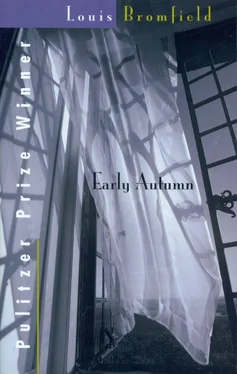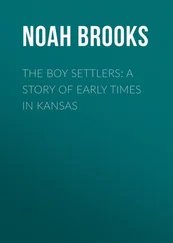He rose from his chair and stood, very tall and thin, with drooping shoulders, looking down at her out of the pale eyes. “It’s about Sybil,” he said. “I understand that she goes riding every morning with this fellow O’Hara.”
“That’s true,” replied Olivia quietly. “They go every morning before breakfast, before the rest of us are out.”
He frowned and assumed almost mechanically a manner of severe dignity. “And you mean to say that you have known about it all along?”
“They meet down in the meadows by the old gravel pit because he doesn’t care to come up to the house.”
“He knows, perhaps, that he wouldn’t be welcome.”
Olivia smiled a little ironically. “I’m sure that’s the reason. That’s why he didn’t come tonight, though I asked him. You must know, Anson, that I don’t feel as you do about him.”
“No, I suppose not. You rarely do.”
“There’s no need to be unpleasant,” she said quietly.
“You seem to know a great deal about it.”
“Sybil tells me everything she does. It is much better to have it that way, I think.”
Watching him, it gave her a faint, warm sense of satisfaction to see that Anson was annoyed by her calmness, and yet she was a little ashamed, too, for wanting the excitement of a small scene, just a tiny scene, to make life seem a little more exciting. He said, “But you know how Aunt Cassie and my father feel about O’Hara.”
Then, for the first time, Olivia began to see light in the darkness. “Your father knows all about it, Anson. He has gone with them himself on the red mare, once or twice.”
“Are you sure of that?”
“Why should I make up such a ridiculous lie? Besides, your father and I get on very well. You know that.” It was a mild thrust which had its success, for Anson turned away angrily. She had really said to him, “Your father comes to me about everything, not to you. He is not the one who objects or I should have known.” Aloud she said, “Besides, I have seen him with my own eyes.”
“Then I will take it on my own responsibility. I don’t like it and I want it stopped.”
At this speech Olivia’s brows arched ever so slightly with a look which might have been interpreted either as one of surprise or one of mockery or perhaps a little of both. For a moment she sat quite still, thinking, and at last she said, “Am I right in supposing that Aunt Cassie is at the bottom of this?” When he made no reply she continued, “Aunt Cassie must have gotten up very early to see them off.” Again a silence, and the dark little devil in Olivia urged her to say, “Or perhaps she got her information from the servants. She often does, you know.”
Slowly, while she was speaking, her husband’s face had grown more and more sour. The very color of the skin seemed to have changed so that it appeared faintly green in the light from the Victorian luster just above his narrow head.
“Olivia, you have no right to speak of my aunt in that way.”
“We needn’t go into that. I think you know that what I said was the truth.” And a slow warmth began to steal over her. She was getting beneath his skin. After all those long years, he was finding that she was not entirely gentle.
He was exasperated now and astonished. In a more gentle voice he said, “Olivia, I don’t understand what has come over you lately.”
She found herself thinking, wildly, “Perhaps he is going to soften. Perhaps there is still a chance of warmth in him. Perhaps even now, after so long, he is going to be pleasant and kind and perhaps … perhaps … more.”
“You’re very queer,” he was saying. “I’m not the only one who finds you so.”
“No,” said Olivia, a little sadly. “Aunt Cassie does, too. She’s been telling all the neighborhood that I seem to be unhappy. Perhaps it’s because I’m a little tired. I’ve not had much rest for a long time now … from Jack, from Aunt Cassie, from your father … and … from her.” At the last word she made a curious little half-gesture in the direction of the dark north wing of the big house.
She watched him, conscious that he was shocked and startled by her mentioning in a single breath so many things which they never discussed at Pentlands, things which they buried in silence and tried to destroy by pretending that they did not exist.
“We ought to speak of those things, sometimes,” she continued sadly. “Sometimes when we are entirely alone with no one about to hear, when it doesn’t make any difference. We can’t pretend forever that they don’t exist.”
For a time he was silent, groping obviously, in a kind of desperation for something to answer. At last he said feebly, “And yet you sit up all night playing bridge with Sabine and old Mrs. Soames and Father.”
“That does me good. You must admit that it is a change at least.”
But he only answered, “I don’t understand you,” and began to pace up and down in agitation while she sat there waiting, actually waiting, for the thing to work itself up to a climax. She had a sudden feeling of victory, of intoxication such as she had not known in years, not since she was a young girl; and at the same time she wanted to laugh, wildly, hysterically, at the sight of Anson, so tall and thin, prancing up and down.
Opposite her he halted abruptly and said, “And I can see no good in inviting Mrs. Soames here so often.”
She saw now that the tension, the excitement between them, was greater even than she had imagined, for Anson had spoken of Mrs. Soames and his father, a thing which in the family no one ever mentioned. He had done it quite openly, of his own free will.
“What harm can it do now? What difference can it make?” she asked. “It is the only pleasure left to the poor battered old thing, and one of the few left to your father.”
Anson began to mutter in disgust. “It is a silly affair … two old … old. …” He did not finish the sentence, for there was only one word that could have finished it and that was a word which no gentleman and certainly no Pentland ever used in referring to his own father.
“Perhaps,” said Olivia, “it is a silly affair now. … I’m not so sure that it always was.”
“What do you mean by that? Do you mean…” Again he fumbled for words, groping to avoid using the words that clearly came into his mind. It was strange to see him brought face to face with realities, to see him grow so helpless and muddled. “Do you mean,” he stammered, “that my father has ever behaved …” he choked and then added, “dishonorably?”
“Anson … I feel strangely like being honest tonight … just for once … just for once.”
“You are succeeding only in being perverse.”
“No …” and she found herself smiling sadly, “unless you mean that in this house … in this room …” She made a gesture which swept within the circle of her white arm all that collection of Victorian souvenirs, all the mementoes of a once sturdy and powerful Puritan family, “in this room to be truthful and honest is to be perverse.”
He would have interrupted her here, angrily, but she raised her hand and continued, “No, Anson; I shall tell you honestly what I think … whether you want to hear it or not. I don’t hope that it will do any good. … I do not know whether, as you put it, your father has behaved dishonorably or not. I hope he has. … I hope he was Mrs. Soames’ lover in the days when love could have meant something to them. … Yes … something fleshly is exactly what I mean. … I think it would have been better. I think they might have been happy … really happy for a little time … not just living in a state of enchantment when one day is exactly like the next. … I think your father, of all men, has deserved that happiness.” She sighed and added in a low voice, “There, now you know!”
Читать дальше












